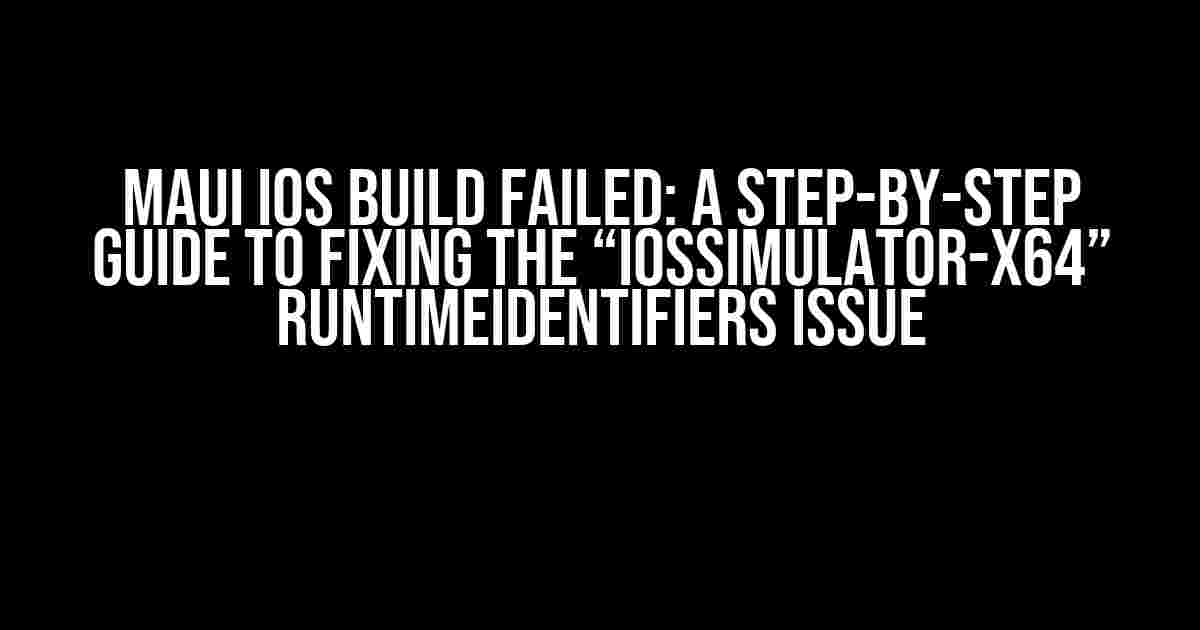If you’re reading this, chances are you’ve encountered the frustrating error message “You may also need to include ‘iossimulator-x64’ in your project’s RuntimeIdentifiers” while trying to build your Maui IOS app. Don’t worry, you’re not alone! In this comprehensive guide, we’ll walk you through the troubleshooting process and provide clear instructions to get your build up and running again.
Understanding the Error Message
The error message itself is quite cryptic, but it’s actually pointing to a common issue with the RuntimeIdentifiers in your project. In essence, it’s saying that your project is missing the ‘iossimulator-x64’ identifier, which is required to build and run your app on the IOS simulator.
What are RuntimeIdentifiers?
RuntimeIdentifiers are essentially a way to specify the target architecture and platform for your app. They’re used by the build system to determine which architecture and platform-specific assets to include in your app. In the case of Maui IOS apps, the required RuntimeIdentifiers are typically ‘ios-x64’, ‘ios-arm64’, and ‘iossimulator-x64’.
Troubleshooting Steps
Now that we understand the error message, let’s dive into the troubleshooting steps to fix the issue. Follow along carefully, and we’ll get your build working in no time!
Step 1: Check Your Project File
Open your `.csproj` file in a text editor or Visual Studio and look for the following section:
<PropertyGroup>
<TargetFramework>net6.0</TargetFramework>
<RuntimeIdentifiers>ios-x64;ios-arm64</RuntimeIdentifiers>
</PropertyGroup>
As you can see, the `RuntimeIdentifiers` section is missing the ‘iossimulator-x64’ identifier. We’ll fix that in a minute!
Step 2: Add ‘iossimulator-x64’ to RuntimeIdentifiers
Add the ‘iossimulator-x64’ identifier to the `RuntimeIdentifiers` section, like this:
<PropertyGroup>
<TargetFramework>net6.0</TargetFramework>
<RuntimeIdentifiers>ios-x64;ios-arm64;iossimulator-x64</RuntimeIdentifiers>
</PropertyGroup>
Save the changes to your `.csproj` file.
Step 3: Update Your Project Configuration
In Visual Studio, right-click on your project and select “Unload Project”. Then, right-click again and select “Reload Project”. This will force Visual Studio to reload the project configuration with the updated `RuntimeIdentifiers`.
Step 4: Clean and Rebuild Your Project
In Visual Studio, go to “Build” > “Clean Solution” to remove any existing build artifacts. Then, go to “Build” > “Rebuild Solution” to rebuild your project with the updated configuration.
Common Issues and Workarounds
While the steps above should fix the issue, you might still encounter some common problems. Here are some workarounds to get you back on track:
Issue 1: Multiple RuntimeIdentifiers
If you have multiple `
<PropertyGroup Condition="'$(target)' == 'ios'>
<RuntimeIdentifiers>ios-x64;ios-arm64</RuntimeIdentifiers>
</PropertyGroup>
<PropertyGroup Condition="'$(target)' == 'iossimulator'>
<RuntimeIdentifiers>iossimulator-x64</RuntimeIdentifiers>
</PropertyGroup>
Becomes:
<PropertyGroup Condition="'$(target)' == 'ios'>
<RuntimeIdentifiers>ios-x64;ios-arm64;iossimulator-x64</RuntimeIdentifiers>
</PropertyGroup>
<PropertyGroup Condition="'$(target)' == 'iossimulator'>
<RuntimeIdentifiers>iossimulator-x64</RuntimeIdentifiers>
</PropertyGroup>
Issue 2: Conflicting TargetFrameworks
If you’re targeting multiple frameworks in your project (e.g., `net5.0` and `net6.0`), ensure that the `RuntimeIdentifiers` are consistent across all target frameworks. You might need to add the ‘iossimulator-x64’ identifier to each target framework’s configuration.
Conclusion
Congratulations! You’ve successfully fixed the “You may also need to include ‘iossimulator-x64’ in your project’s RuntimeIdentifiers” error in your Maui IOS build. By following these steps and understanding the role of RuntimeIdentifiers, you’re now better equipped to tackle similar issues in the future.
FAQs
| FAQ | Answer |
|---|---|
| What is the purpose of RuntimeIdentifiers? | RuntimeIdentifiers specify the target architecture and platform for your app, allowing the build system to include the correct assets. |
| Why do I need to add ‘iossimulator-x64’ to my RuntimeIdentifiers? | The ‘iossimulator-x64’ identifier is required to build and run your app on the IOS simulator. Without it, your build will fail. |
| Can I target multiple frameworks in my project? | Yes, but ensure that the RuntimeIdentifiers are consistent across all target frameworks to avoid conflicts. |
We hope this comprehensive guide has helped you resolve the “iossimulator-x64” RuntimeIdentifiers issue in your Maui IOS build. If you have any further questions or concerns, feel free to ask in the comments below!
Additional Resources
Stay tuned for more tutorials, guides, and articles on Maui development and troubleshooting. Happy coding!
Here are 5 FAQs about “Maui iOS build failed with ‘You may also need to include ‘iossimulator-x64’ in your project’s RuntimeIdentifiers'”:
Frequently Asked Question
Having trouble with your Maui iOS build? Don’t worry, we’ve got you covered!
What does the error message “You may also need to include ‘iossimulator-x64’ in your project’s RuntimeIdentifiers” mean?
This error message indicates that your Maui project is missing the necessary RuntimeIdentifiers to build and run on iOS simulators. The ‘iossimulator-x64’ identifier is required for 64-bit iOS simulators.
How do I fix the “You may also need to include ‘iossimulator-x64′” error in my Maui project?
To fix this error, you need to add ‘iossimulator-x64’ to your project’s RuntimeIdentifiers in the .csproj file. You can do this by opening the .csproj file in a text editor, finding the RuntimeIdentifiers node, and adding ‘iossimulator-x64’ to the list of identifiers.
Why is ‘iossimulator-x64’ required for my Maui project?
‘iossimulator-x64’ is required because it allows your Maui project to run on 64-bit iOS simulators, which are the default simulators used in Xcode. Without this identifier, your project won’t be able to run on these simulators, causing the build to fail.
Can I ignore the “You may also need to include ‘iossimulator-x64′” error and still build my Maui project?
No, you can’t ignore this error and still build your Maui project. The error is a requirement for building and running your project on iOS simulators. Without adding ‘iossimulator-x64’ to your project’s RuntimeIdentifiers, your project won’t be able to run on iOS simulators, making it impossible to test and debug your app.
Where can I learn more about RuntimeIdentifiers and Maui project configuration?
You can learn more about RuntimeIdentifiers and Maui project configuration in the official Microsoft documentation for .NET MAUI. The docs provide detailed information on how to configure your project, including adding RuntimeIdentifiers and managing dependencies.

